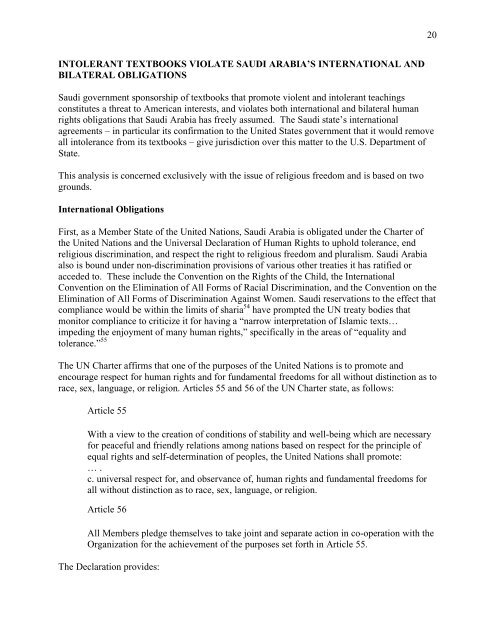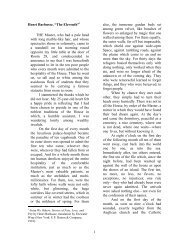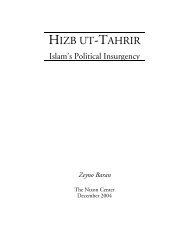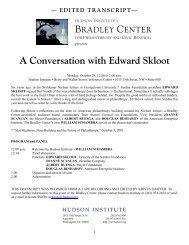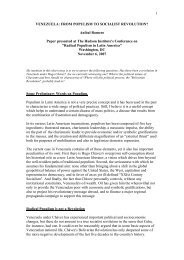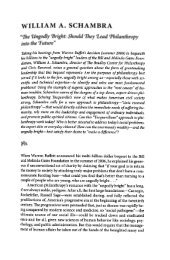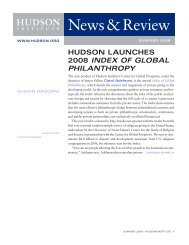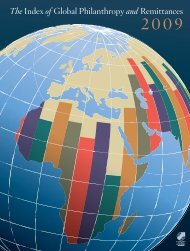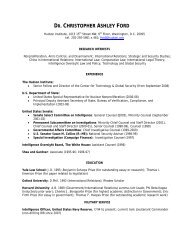Saudi Arabia's Curriculum of Intolerance - Hudson Institute
Saudi Arabia's Curriculum of Intolerance - Hudson Institute
Saudi Arabia's Curriculum of Intolerance - Hudson Institute
Create successful ePaper yourself
Turn your PDF publications into a flip-book with our unique Google optimized e-Paper software.
20<br />
INTOLERANT TEXTBOOKS VIOLATE SAUDI ARABIA’S INTERNATIONAL AND<br />
BILATERAL OBLIGATIONS<br />
<strong>Saudi</strong> government sponsorship <strong>of</strong> textbooks that promote violent and intolerant teachings<br />
constitutes a threat to American interests, and violates both international and bilateral human<br />
rights obligations that <strong>Saudi</strong> Arabia has freely assumed. The <strong>Saudi</strong> state’s international<br />
agreements – in particular its confirmation to the United States government that it would remove<br />
all intolerance from its textbooks – give jurisdiction over this matter to the U.S. Department <strong>of</strong><br />
State.<br />
This analysis is concerned exclusively with the issue <strong>of</strong> religious freedom and is based on two<br />
grounds.<br />
International Obligations<br />
First, as a Member State <strong>of</strong> the United Nations, <strong>Saudi</strong> Arabia is obligated under the Charter <strong>of</strong><br />
the United Nations and the Universal Declaration <strong>of</strong> Human Rights to uphold tolerance, end<br />
religious discrimination, and respect the right to religious freedom and pluralism. <strong>Saudi</strong> Arabia<br />
also is bound under non-discrimination provisions <strong>of</strong> various other treaties it has ratified or<br />
acceded to. These include the Convention on the Rights <strong>of</strong> the Child, the International<br />
Convention on the Elimination <strong>of</strong> All Forms <strong>of</strong> Racial Discrimination, and the Convention on the<br />
Elimination <strong>of</strong> All Forms <strong>of</strong> Discrimination Against Women. <strong>Saudi</strong> reservations to the effect that<br />
compliance would be within the limits <strong>of</strong> sharia 54 have prompted the UN treaty bodies that<br />
monitor compliance to criticize it for having a “narrow interpretation <strong>of</strong> Islamic texts…<br />
impeding the enjoyment <strong>of</strong> many human rights,” specifically in the areas <strong>of</strong> “equality and<br />
tolerance.” 55<br />
The UN Charter affirms that one <strong>of</strong> the purposes <strong>of</strong> the United Nations is to promote and<br />
encourage respect for human rights and for fundamental freedoms for all without distinction as to<br />
race, sex, language, or religion. Articles 55 and 56 <strong>of</strong> the UN Charter state, as follows:<br />
Article 55<br />
With a view to the creation <strong>of</strong> conditions <strong>of</strong> stability and well-being which are necessary<br />
for peaceful and friendly relations among nations based on respect for the principle <strong>of</strong><br />
equal rights and self-determination <strong>of</strong> peoples, the United Nations shall promote:<br />
… .<br />
c. universal respect for, and observance <strong>of</strong>, human rights and fundamental freedoms for<br />
all without distinction as to race, sex, language, or religion.<br />
Article 56<br />
All Members pledge themselves to take joint and separate action in co-operation with the<br />
Organization for the achievement <strong>of</strong> the purposes set forth in Article 55.<br />
The Declaration provides:


